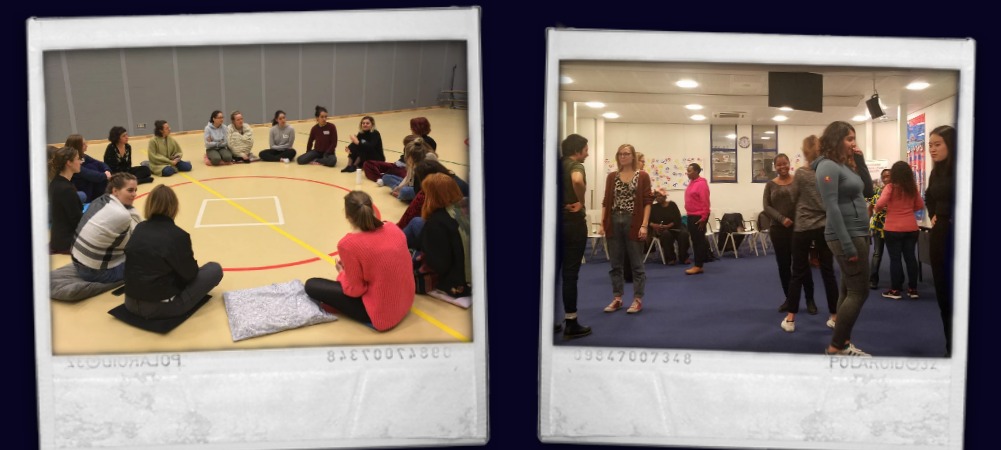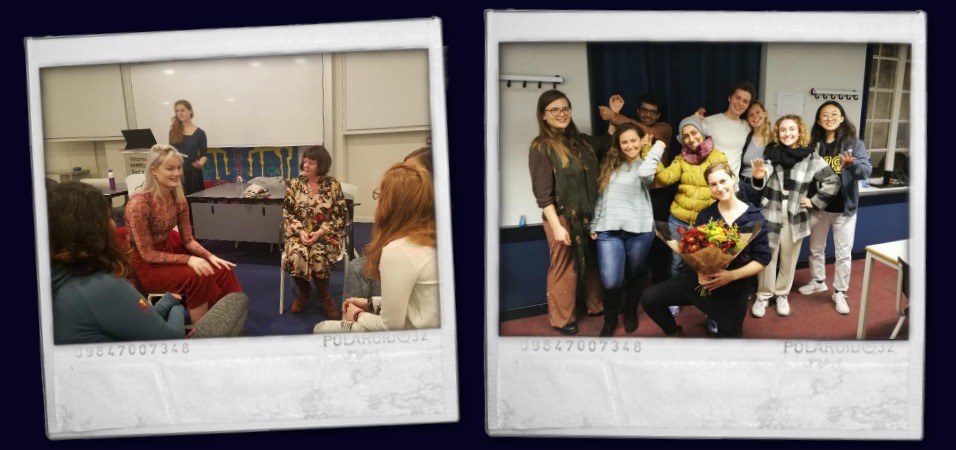Consent
In may 2017 I started collaborating with Consent Matters, a student initiative born from University College Maastricht. After graduating these students have set up a foundation which purpose is to raise awareness and educate students about consent. This initiative was inspired by the observation of sexual violence in student culture in Maastricht and on statistics on sexual violence. 41% of all people (women and men) aged 19 and upwards experience some form of sexual encounter against their will in the Netherlands (Rutgers, 2017). Consent Matters is striving for an implementation of a mandatory workshop on consent for first year students and are currently speaking to different parties such as University Maastricht and Hogeschool Zuyd to make this happen.
Thanks to this initiative I have had the pleasure to engage different groups of people in the concept of consent. Their reactions, feedback and questions have inspired me to keep improving and developing the content of my workshops on consent. This article describes the story of this development and touching upon some of the topics I have found to be vital in consentwork.
The first thing I noticed when I started exploring consent was how often I took permission for granted. I also became more aware of my boundaries (and how often they are crossed). My sensitivity and awareness started growing. Focusing on consent can be a very self-reflective process, which might uncover a desire to improve some soft skills. And, not going to lie, it can trigger some frustration at first for some..
“It’s so frustration that in this workshop everyone is super nice and considerate, but I know that when I walk out of here in the real world it’s not like that at all!”
– Participant of an consent workshops
Consent Matters is a response to the many negative sexual experiences that are occurring in Maastricht student life. It is also a respons to researchdata around sexual violence: 41% of all people (women and men) aged 19 and upwards experience some form of sexual encounter against their will in the Netherlands (Rutgers, 2017). Consent Matters is striving for an implementation of a mandatory workshop on consent for first year students and are currently speaking to different parties such as University Maastricht and Hogeschool Zuyd to make this happen.
The world we live in is not very consensual most of the time, and this can be a painful realisation for anyone. Especially for people with a heightened sensitivity around boundaries (people that are very self aware or people who have a history of sexual violence or sexual trauma) interaction with others can be overwhelming. Learning about and engaging in consentwork (in a context appropriate to you) can increase your abilities in setting boundaries, (sexual) relationships, accelerate your personal development and improve your mental health.
Working with the concept of space
My first musings about what a consent workshop should contain gave me the framework of ‘space’, or the lack thereof. This space can be physical (how is the other positioned in relation to you and the space) or more abstract or symbolic (who speaks the most or how strong are the opinions someone expresses in a dialogue).
In ‘63 there was a cultural anthropologist who thought deeply about the human use of space. Edward Hall studied the effects that population density has on behaviour, communication, and social interaction. He referred to this topic of study as ‘proxemics’. Have you ever thought about how the mere proximity of your body can affect people? Within the workshops I’ve tried to facilitate practise and reflection on exchanging information about the effects you might have on others by offering practical exercises as well as dialogue on consent.
As I took grew more acquainted with exploring consent with groups of people I found it helpful to work with a personal development framework. Through this lens we can view a large portion of non-consensual interactions as a symptom of an underdevelopment of specific soft skills of the people involved. And much can be gained when you focus on your personal development in those areas (and of course much can be won by remaining sober as well).


Workshop Topic List
Presence and mindfulness
Practise to be present and mindful of what is happening in the moment. In this manner you will be much more aware of the boundaries and social cues of both people involved.
Self reflection
Practising your self reflection skills is a very helpful tool in discovering more about your interactions with others and about your needs and boundaries.
After some time I settled on starting all workshops by asking the group to divide into small groups to discuss their current ideas and thoughts on consent. This dialogue is so valuable, it creates diverse reference points, brings up questions and as I found, often fosters connection through recognition and empathy. I learn something every time I speak with someone about this topic.
Questions I suggest: What are your associations with the concept of consent? How would you describe consent? What does consent mean to you? What would you like to learn about consent?
Be self-sufficient
Breathe, relax. Try not to rely on the other person for stimulation or emotions. I.e. relying on the other person to not be bored, feel happy or be turned on.
Emotion regulation
Hearing a ‘no’ can trigger emotional responses in us, how do you deal with these emotions? Do they influence your behaviour towards the other person? A great example of where this can go south is when you interpret someone else’s boundary as a personal rejection.
Assertiveness
Assertiveness makes it a lot easier to avoid non-consensual situations. It’s often a skill that is either a bit underdeveloped (sub-assertiveness) or over developed (aggression) in people. In my opinion this is one of the most important skills to practise to become a happier and socially adequate person.
Nathaniel Brandon describes the practice of self-assertiveness beautifully: “Being authentic in our dealings with others; treating our values and persons with decent respect in social contexts; refusing to fake the reality of who we are or what we esteem in order to avoid disapproval; the willingness to stand up for ourselves and our ideas in appropriate ways in appropriate contexts.”
A side note I must make here is that assertive behaviour is not acceptable across cultures. Working with international students has highlighted many interesting differences in communication.
One of the exercises I have used in this context is one where I ask the participants to form a circle and come up with a non-verbal greeting. This can be a wave, a high five, a nod and so on. Then I point to two people and instruct them to meet in the middle of the circle and try to use their greeting. This creates many funny moments where people find last minute solutions to still make the greeting work or notice how it’s impossible to collaborate when you stick to your own plan.
It generates conversations about cultural touch, adapting to other cultures, reading body language that is different in meaning within other cultures and much more.
Attunement and adaption
How do you tune in to another person and understand their needs? How can you adapt your behaviour based on the feedback of the other person?
To illustrate and practise this point I use different non-verbal communication games and exercises. An example is dividing everyone in couples and have one follow the movements of the other as if they were the mirror image of the other.
Seek to understand
Do you know what does your partner want or need? Make no assumptions.
Open communication
I see being open and authentic in your communication as a practise that is vital to consensual interactions. Consent is only achieved if you both have all the relevant information after all.
Not all of these topics are easy to implement in your life, my main goal in these workshop is to offer a frame of reference. In the workshop I hope to facilitate a deeper understanding of consent through offering information and exercises that generate more self-knowledge and awareness. And of course I offer many ideas and exercises that the participants can use to start the dialogue about consent with the people in their life. In this manner I hope to stimulate further exploration of this beautiful topic.
Given consent is tied to the current moment and is bound to the changing tides of our perception.
Akin to how you can never step into the same river twice,
consent is an ongoing conversation and a concept that is always new and worth investigating.

Since 2017 I give workshops for Consent Matters Maastricht. My background in experiential therapy and my interest in topics such as assertiveness, boundaries, intimacy and self awareness ensure my motivation to strive for more awareness around consent.

Drama therapist
